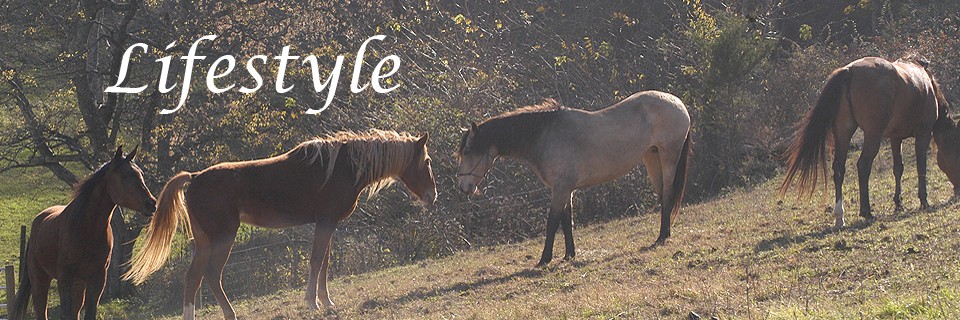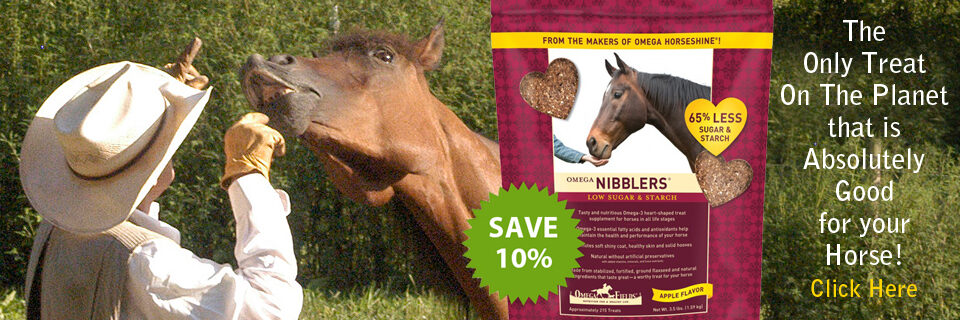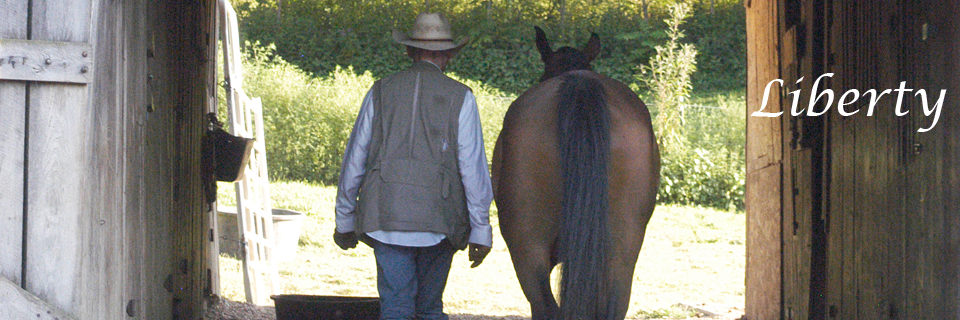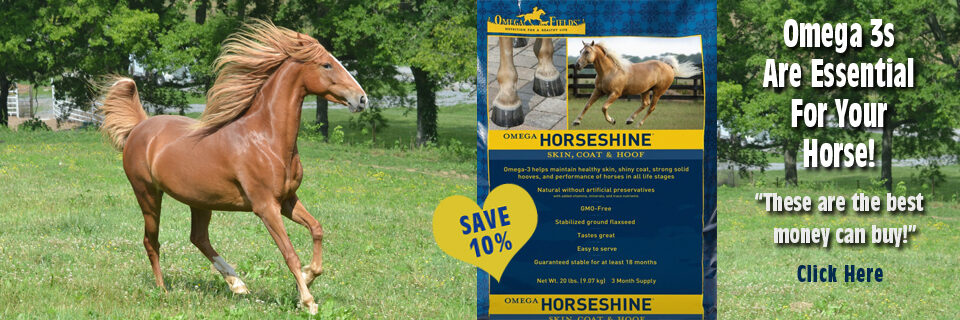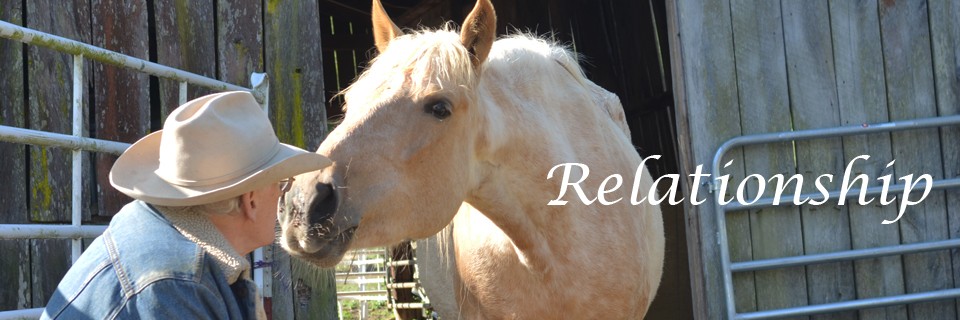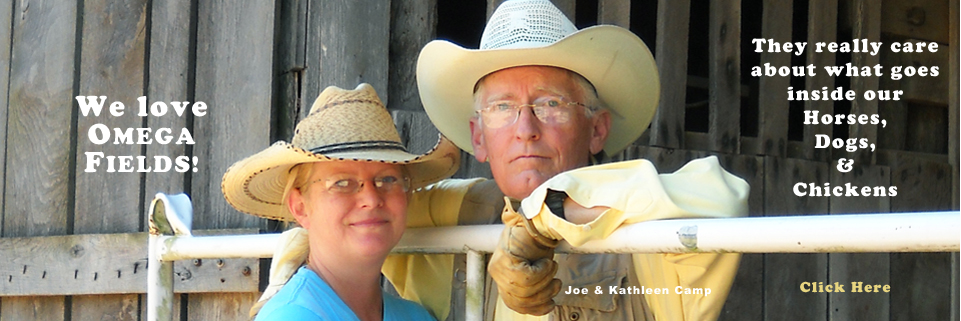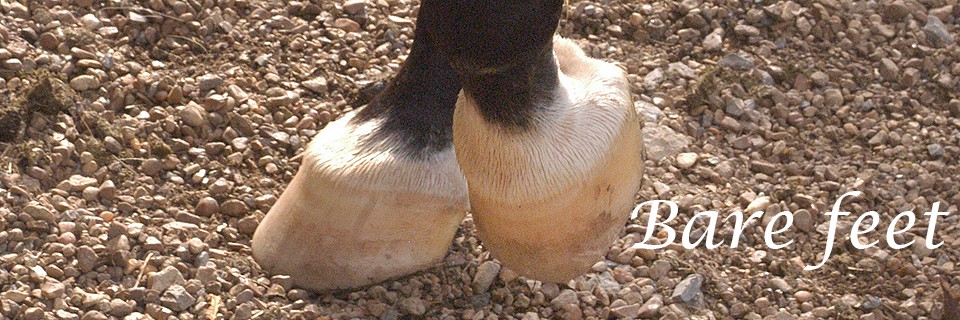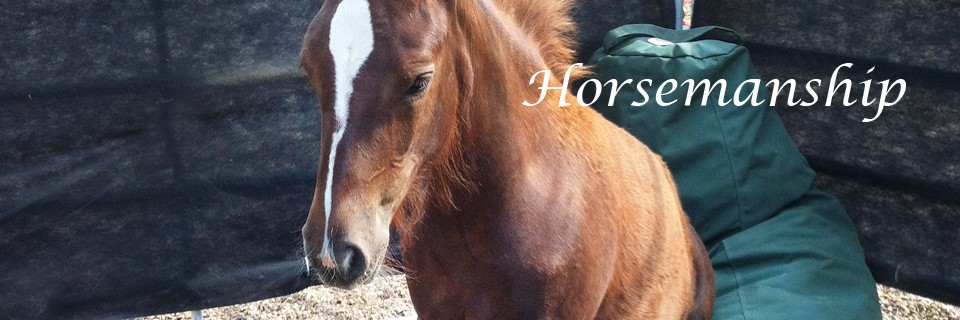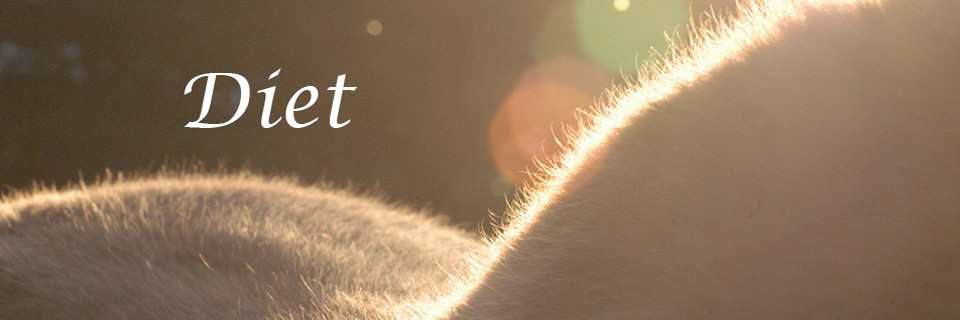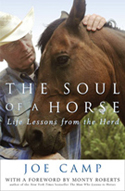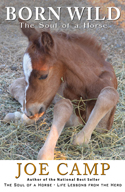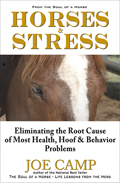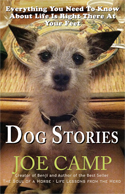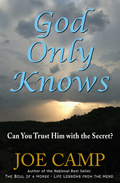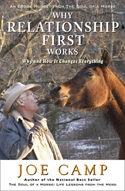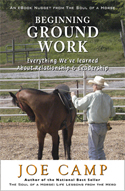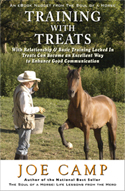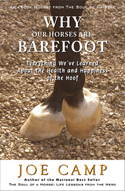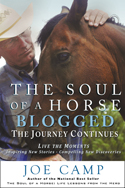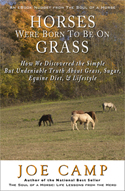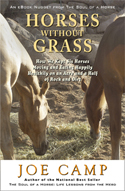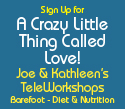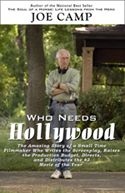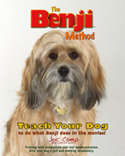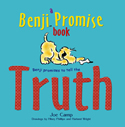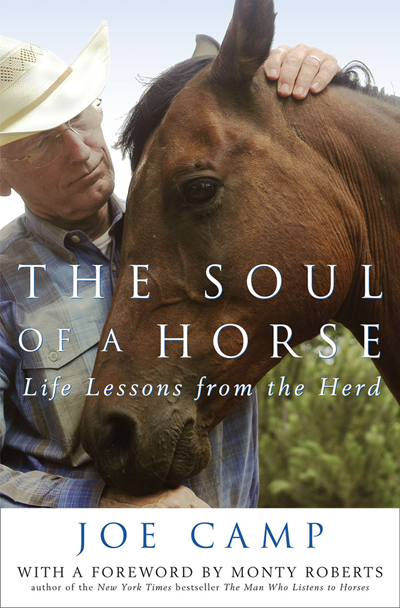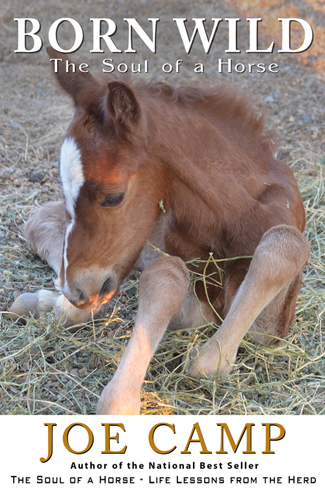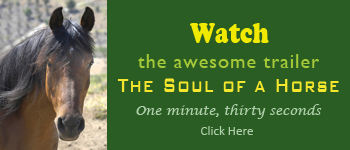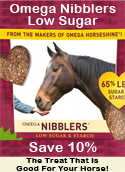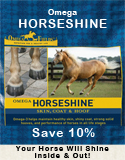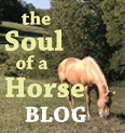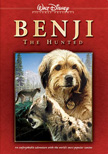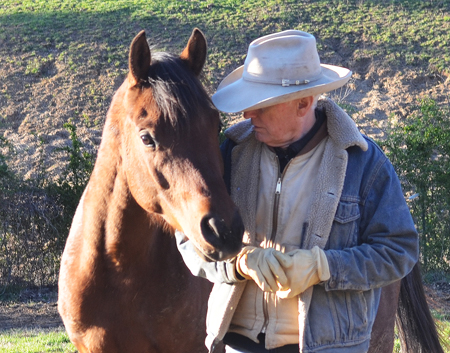
He’s not Cash. But he’s doing a fine job of keeping my present tense reminded of why Cash was so special and will never be forgotten, in a way that is no longer so filled with tears but, once again, with joy. A fine job indeed. Thank you God, and Cash, for sending him. Kathleen named him Ezekiel. Ezekiel was a major prophet in the Old Testament delivering this message from God: I will give you a new heart and put a new spirit in you. Seemed appropriate. We call him Zeke. And he’s a joy.
When Zeke came into our lives, as terrific as he was, he had a lot of issues, especially around feeding time. He’s had seven owners during his seven years of life. And the one three months before we found him had completely abandoned him and several other horses when his show barn had gone into bankruptcy. The owners just walked away. The horses didn’t have enough to eat and grew very thin. Aubree Becker, from whom we acquired Zeke, guessed that he was probably 400 pounds underweight the first time she saw him. She worked him up to maybe 200 pounds underweight when he came home with us and within a few months was back to normal.
He ate like there was no tomorrow. Ate fast like the food might disappear any minute if he didn’t finish it. We knew that it was going to take a while for him to trust the notion that here at his new home he would always have enough to eat, of all the right stuff. And that grass or grass hay would be available around the clock, 24/7/365. And at feeding times nobody was going to mess with his portions. He had to learn how to trust, perhaps for the first time in his life.
One evening I was standing in the tack room doorway talking with Kathleen who was inside. Zeke walked up behind me, poked his head across my shoulder, and blew in my nose. I turned and blew lightly back, scratched him on the cheek, and continued talking.
“You know what he’s asking for don’t you?” Kathleen said.
I nodded. “In a minute.”
Zeke dropped the weight of his head on my shoulder and waited patiently. Little crinkly smiles crept across both our faces.
Finally I turned to him and said, “Good boy. I’ll get it for you.”
We have a tradition at the evening feed. After each horse finishes his or her meal they get a handful of alfalfa. Dessert, if you will. It all started with No Agenda Times. Horses love alfalfa so we use it during No Agenda Times to help them overcome their fears and see, on their own, that there was no reason for the fear in the first place. Like Saffron when she first came to us, fresh from the wild and pregnant. We would scatter a bit of alfalfa right around our feet and even sometimes between our chairs. Saffron wouldn’t allow either of us to touch her. We couldn’t even stand up or she’d be gone. But she would munch alfalfa mere inches away while we talked about the day and completely ignored her. Made no effort whatsoever to touch her. It took 35 such evenings before a switch clicked and suddenly she was all in. From zero to a hundred in a nano-second. You can read about it in Born Wild, or No Agenda Time, or Mind Boggling This Relationship.
It wasn’t long before we began to feel guilty about the other horses peering into the paddock and seeing Saffron munching alfalfa. So, you guessed it, we finally gave in and began to give a little to everybody after they finish their dinner.
It’s been a delight to watch Zeke’s transition begin to settle in. But in the beginning he got used to his dessert of alfalfa flying in immediately after he finished his dinner. Immediately! He would huff and puff and shake his head and stomp his feet. Nothing really aggressive, but you couldn’t help but believe that he wanted you to think it was. But that wasn’t the case. It was fear that maybe the alfalfa wasn’t coming at all. Trust was unknown to him. I had already learned about a lot of bad stuff in his past and after observing him and interacting with him for a while I actually became amazed that he was, overall, still as good and well-behaved a boy as he was.
One of the first things I do with a new horse is teach him to back up, or if he knows already, I teach him how we do it. Who moves who in a herd is the determining factor of who is dominant over who. Who is the leader and who is the follower. So I want to be able to back a horse, willingly, half way to Nashville if necessary to remind him or her that I am the one doing the moving. Just a safety precaution on my part that I hope I never seriously need but, just in case, it is a completely non-hostile reminder of who the leader is.
Remember, we live and work with our horses totally at liberty. Which is a tonic for trust. Both ways. But when I started asking Zeke to back up he would toss his head and stomp, sort of prancing, backward, even rearing a bit. He would back up, but there was a lot going on inside. My first reaction was holy moly (or worse :) what is wrong with him?! And Kathleen didn’t want to get near him. But then I began to actually watch him closely and I began to visualize exactly what I bet was going on. Some trainers teach back up by shaking the lead rope. Their instruction is to shake it as lightly as possible but shake it as hard as necessary to get the horse to take a step backward. Then stop and praise… and do it again. Over and over. That brass halter clip on the end of a lead rope can be pretty heavy. And a hard whip-lashing shake of the rope could be popping the horse in the jaw with the clip. To which he or she is going to react… exactly like Zeke was reacting.
We, of course, had no lead rope. And I wasn’t swinging my arm, just sort of flicking my fingers toward his chest. But I was speaking pretty loudly since it was an initial effort. Like speaking to someone who doesn’t understand our language so we speak louder. When they still don’t understand, we speak even louder. The concept makes no sense, but I’ve done it. I suspect we all have :). So I reversed myself, pushing all adrenaline down into my toes, and whispered the words “back up,” barely flicking my fingers toward his chest. “Go on, back up. Easy.” He took a very quiet step back. “One more,” I whispered, with another little flick of the fingers. And he took another step quietly backward. “Such a good boy!” I said. And gave him a treat to confirm his understanding that this is exactly what I was asking for. It’s been such a delight to watch his eyes and face and ears as the realization begins to sink in that this is a totally new experience, unlike any he’s had before; as he lets his fear dissipate and trust creep into his being.
By the way, the method I used to teach Saffron to back up, at liberty, was quite simple and much more effective than any rope has ever been. I simply pushed my thumb into her chest saying back up until it became annoying enough to cause her to take a step backward to relieve the pressure. At which time I’d praise her and give her a treat. It took ten or fifteen minutes tops for her to have it down pat. A solid back up.
But back to Zeke. He is teaching both Kathleen and me everyday to listen to him. To take the adrenaline out of the experience and feel a deep breath settling over it all. No agenda-driven have-to-get-this-done-today experiences. Some days at feeding times we just hang out. Me fixing the buckets. Zeke munching hay undisturbed. Zeke eats each meal in the breezeway of the barn, where Cash used to eat. I open the door to the hay room and he’s welcome to munch any Bermuda he can reach while I’m in the tack room loading buckets with Triple Crown Chopped Forage (a forage in a bag we call chopped salad), California Trace (in the mornings; a supplement), Omega Fields Horseshine, and diatomaceous earth in varying quantities for parasites. I’m in and out and back and forth a lot, always giving Zeke a rub when passing close enough.
In the beginning he would come up shaking his head, wanting to get pushy asking for a treat. And every time he did that, I would bring my adrenaline down, which would bring his adrenaline down, talk softly, barely gesturing, and I would teach him something brand new that would get him a treat. It didn’t take long for him to realize that treats came as a reward for smiling, giving kisses, flexing to one side or the “other”, making a bow, waving hello with his foot, or his “other” foot, or backing up calmly… and that anytime he asked for a treat without doing something for it he’d get to learn something new.
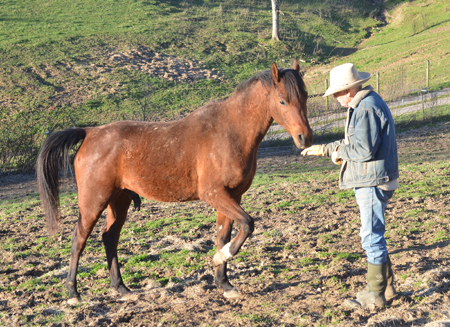 Learning to wave hello with his foot
Learning to wave hello with his foot
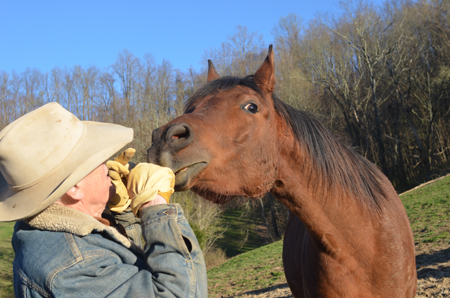 Learning to smile
Learning to smile
The asking stopped. Except every once in a while he’ll walk up and wave hello or flex or smile or all of the above. And if he’s sweet enough about it, he’ll usually get one. But for the most part he never asks anymore. Just like he never comes up huffy and puffy demanding his alfalfa anymore. He just lets us know that he has finished his meal, in a very quiet and calm way. And I know exactly what he’s doing. And I listen.
Sometimes it’s easy to forget things like how long Cash and I were together and how much time I spent with him. How long it took for mustang Saffron to become the sweetest horse in the entire world. But Zeke has reminded me.
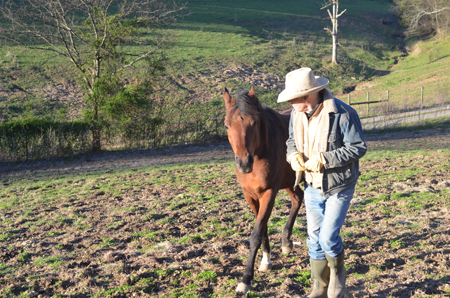 “Walk with me Zeke.”
“Walk with me Zeke.”
He walks with me from any point to any other point. And he comes to a call. If he can hear me. Yesterday morning five of the horses were within earshot and could see me waving them down the hill. They came. But Zeke and his two mustang friends Saffron and Noelle were apparently over the ridge and the wind was coming from that direction so I want to believe he couldn’t hear me call. Finally I walked up and over the ridge and there they were, still a good ways away, but when I called his name Zeke looked up immediately and came running.
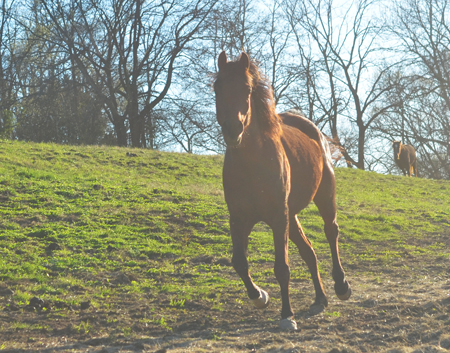
Saffron and Noelle picked up his pace and it was a little bit scary as they were all headed right toward me and the pastures were still wet and slick from weeks and weeks of rain. But all went well and the four of us walked back down to the barn. Kathleen saw it all and tried to snap a photo on her phone but Stormy kept trying to eat the phone so nothing came of it. That was yesterday. This is the way it looked this morning:
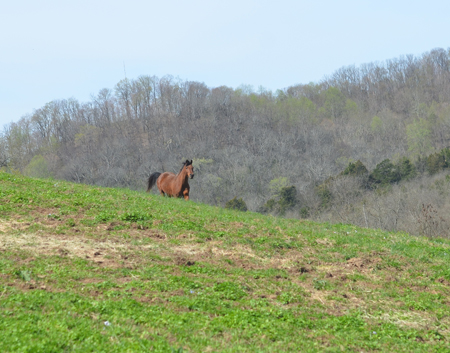
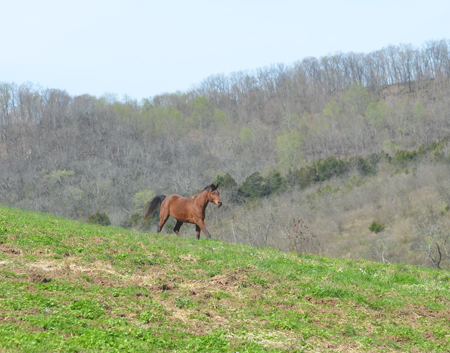
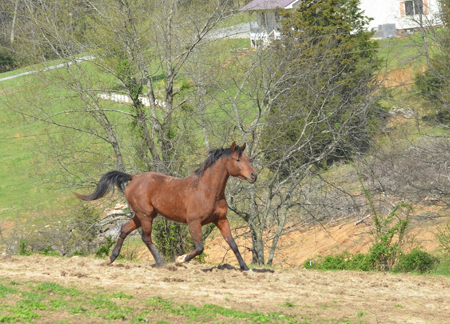
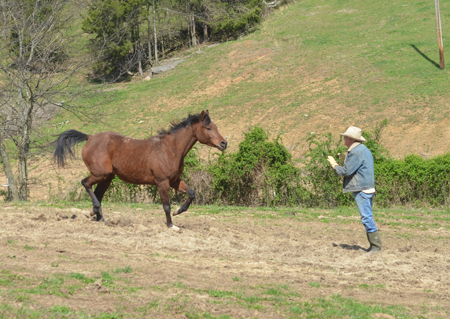
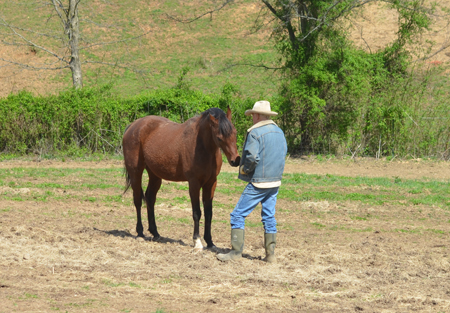
Not long ago a friend sent me this note in response to something I had posted about Zeke: “…a writer I know uses the expression: ‘meeting halfway’. No egos allowed to be involved. I suspect that when adrenaline is on we need to check to see if our ego is involved causing fear responses from the horse.”
This is my response to him: Thank you for the kind words about the blog… but I don’t really think “meeting halfway” is the key to relationship with a horse. With Zeke the burden was mostly on me… to evaluate his issues and reactions and then lead him out of them into a new life. Notice I said “lead”… not force, not cajole, not create a conclusion that I, the human, want… but to let him see and understand that there is no longer any cause for him to fear, and to understand what that can mean to him, which of course is trust. An absence of fear. I could lead him through that, and demonstrate, but I had to let him make the choices.
I learned that in the very beginning with my first horse and Monty Roberts Join Up. The most important element in the process is leaving the choice to the horse. I must convince him that there’s no reason to fear. And therefore there is reason to trust. That nothing bad is going to come from all this. Again, in Zeke’s case, possibly for the very first time in his life.
This is all very simple, if you let it be. Before you ever start, evaluate your motivation. Why are you doing this? What is your goal? Your objective? Why are you working on this relationship. And I can truly say that my objective is the same one that God asks of us. Complete and total trust. And that goal, at least on the human or God side, is born in complete and total love. I love this horse and I want him to trust that I will do nothing, ever, to violate that trust. If that is your true goal then you will do the right things to get there. So… if trust is your goal, and love is your motivation, then you should never have to check your ego, and it will never enter your mind to ask the horse to meet you halfway.
This is not a mechanical process. Not an intellectual process. It is totally, completely, and interactively emotional. On both sides. And for that reason it can never accurately or truly be codified. Please remember this when you’re looking at trainer lists, methods, outlines, levels, etc. It’s somebody’s attempt to codify something that has emotional, not intellectual, experience at its heart. At its soul, if I may :)
If your primary goal is to ride the horse, or train the horse, or get the respect of the horse, or win blue ribbons and trophies, then, I’m sorry, I believe that you are starting in the wrong place. A horse is a living, breathing, sentient being who happens to have a genetic system that is founded in fear. Because he is a prey animal and he has no defense against predators except to run. He reacts first and asks questions later. If he didn’t we’d have never known the horse. He would’ve been extinct thousands if not millions of years ago.
But when you start with relationship first because you care about this horse and this relationship, and you allow him to prove to himself that he can trust you, that you are worthy of his trust, and he chooses, of his own free will, to trust you, then everything changes. Everything. You will then have a willing partner who will never stop trying for you.
Many trainers set out to teach beginners to get their horse’s “respect” so that they will be safe. So that their horse won’t hurt them. At first blush that’s a reasonably sane concept. But where there is no relationship of trust, whether these teaching folks choose to tell you this or not, there is always an element of force or domination involved in an attempt to obtain a “show of respect” from an untrusting, fearful horse. Not necessarily physical domination, but, at the very least, mental domination of the horse.
To anyone who doubts this I say throw away your halter and lead rope and then attempt to teach that lesson in “respect” to an untrusting, fearful horse. When you are in relationship, when your horse trusts you, when he has made that decision on his own, you don’t need the halter and lead rope to teach. And respect is a natural byproduct of that trust. Zeke has proven that. Our entire herd has proven that.
I didn’t train Zeke to come to me when I call his name. As the trust evolved and the fear dissipated, that’s something he chose to do on his own. Which is a pretty strong testimony for what trust can do, seeing as how, at this writing, we’ve only been at this a few months. And usually he comes running. Which frankly in the wet weather we’ve been having I would prefer he not do. But he insists.
This morning, as he tore into the barn breezeway he ran up to me, skidded to a stop, and gently touched his lips to mine. He was giving a kiss. He knew it would get him a treat. But he also wanted to do it. He wanted to please me. And I wanted to please him. After the treat I gave him a hug and we both went about our business, me prepping buckets for feeding. Him munching hay from the hay room. To daily be in the presence of humans who have no agenda with him whatsoever – no plans to halter him or tie him up, or cause him fear, or pain, or worse – is the best tonic for eliminating that fear and building trust. Once all this is etched in stone, then we’ll get to other things, like riding. But from a position of total trust.
And all of that is helped along immensely by the fact that he’s living life like a horse, probably for the first time in his seven years. Free range on 22 or so acres 24/7.
The relationship I have with Zeke is not unique. It’s just not usual. Because way too many people begin at all the wrong places. They don’t focus on trust. Every horse on the planet would prefer to be in good relationship with any potential predator. Why? Because their number one concern is their safety, and if they have learned they can trust you that eliminates one fear and opens the door to good relationship. It means one less predator to worry about.
If you start by caring, and focus on trust everything else will be simple. Or at least much simpler. Because, as I mentioned earlier, when your horse has chosen, on his own, to trust you, everything changes for the better. I suppose I must’ve taken all this for granted. Because I allowed my very first horse to choose me in Join Up. To tell me that he trusted me to be his leader. Not the other way around. It was his choice. And when it happened everything changed. For me, and my horse. He was no longer my horse. I wasn’t his owner. The first line of the movie Hildago said it right. Cash was now my little brother.
And I promised him that day that he would have the best life I could possibly give him. And I meant it.
No stone would be left unturned because I now cared deeply about this horse and I would be asking everywhere I went how do I make his life better. Not how do I make my life better. My life would get better when his did.
And so it is with Zeke.
Suffice to say, it’s been a joy learning from Zeke, allowing him to take me back to the beginning, watching the trust emerge, allowing the trust to emerge, and watching the adrenaline drop. Learning how very very bright he is. And how quickly he gets things. He’s not Cash, of course. There are a lot of reminders, but he’s not Cash. He’s Zeke. I still think of Cash all the time, but Zeke is making it so much easier. So many fewer tears. So many more smiles about the good times.
And the good times to come.
“I’m happy,” I told Kathleen. It does my heart so much good every time I see a bit more of his fear draining away, a bit more trust replacing it, and his funny little look as if he were saying “Really?? That’s all you wanted?? Really?? Wow.”
“Yeah, really.” says I.
“You’re grinning out loud,” says Kathleen.
I suppose I am.
Buy ’em – Try ’em
Save 10% by clicking this link
and using the coupon code JOECAMP10 at checkout
Read More
Download Flyer
Send a copy of your Omega Nibblers email purchase confirmation to
nancy@thesoulofahorse.com
and receive a free PDF copy of Training with Treats!
——-
Go to TheSoulOfaHorse.com Homepage
The Soul of a Horse Video Channel on Vimeo
Visit The Soul of a Horse Channel on YouTube
——-
The story of our journey with horses (to date) is told in the two books that follow: the national best seller The Soul of a Horse – Life Lessons from the Herd and its sequel Born Wild – The Soul of a Horse.
And what a story it is as two novices without a clue stumble and bumble their way through the learning process so that hopefully you won’t have to. If you haven’t read both of these books already please do because with that reading, I believe, will come not just the knowledge of discovery but the passion and the excitement to cause you to commit to your journey with horses, to do for the horse without waiver so that your relationship and experience will be with loving, happy and healthy horses who are willing partners and who never stop trying for you. Horses like ours.
Read the National Best Seller that started it all.
Now in its 17th Printing.
National Best Seller
#1 Amazon Best Seller
#1 Amazon “Hot New Releases”
At Bookstores Everywhere
Amazon & Kindle
Barnes & Noble
Order Personally Inscribed Copies of The Soul of a Horse
Order Both The Soul of a Horse & Born Wild – Save 20%
Both Personally Inscribed
Please list the names for each inscription in the “instructions to Seller” field as you check out!
Read More About The Soul of a Horse
Watch The Soul of a Horse Trailer
The highly acclaimed best selling sequel to
The Soul of a Horse – Life Lessons from the Herd
#1 Amazon Best Seller
#1 Amazon “Hot New Releases”
Amazon & Kindle
B&N
Order Personally Inscribed Copies of Born Wild
Order Both The Soul of a Horse & Born Wild – Save 20%
Both Personally Inscribed
Please list the names for each inscription in the “instructions to Seller” field as you check out!
Read More About Born Wild
Read More About The Soul of a Horse
Watch The Soul of a Horse Trailer
Watch the Born Wild Trailer
“Joe Camp is a master storyteller.” – The New York Times
“One cannot help but be touched by Camp’s love and sympathy for animals and by his eloquence on the subject.” – Michael Korda, The Washington Post
“Joe Camp is a natural when it comes to understanding how animals tick and a genius at telling us their story. His books are must-reads for those who love animals of any species.” – Monty Roberts – Author of New York Timers Best-seller The Man Who Listens to Horses
“Camp’s tightly-written, simply-designed and powerfully drawn chapters often read like short stories that flow from the heart.” Jack L. Kennedy – The Joplin Independent
“Joe Camp is a gifted storyteller and the results are magical. Joe entertains, educates and empowers, baring his own soul while articulating keystone principles of a modern revolution in horsemanship.” – Rick Lamb – TV/Radio host – The Horse Show
Watch The Soul of a Horse Book Trailer
Go to TheSoulOfaHorse.com Homepage
The Soul of a Horse Video Channel on Vimeo
Visit The Soul of a Horse Channel on YouTube














